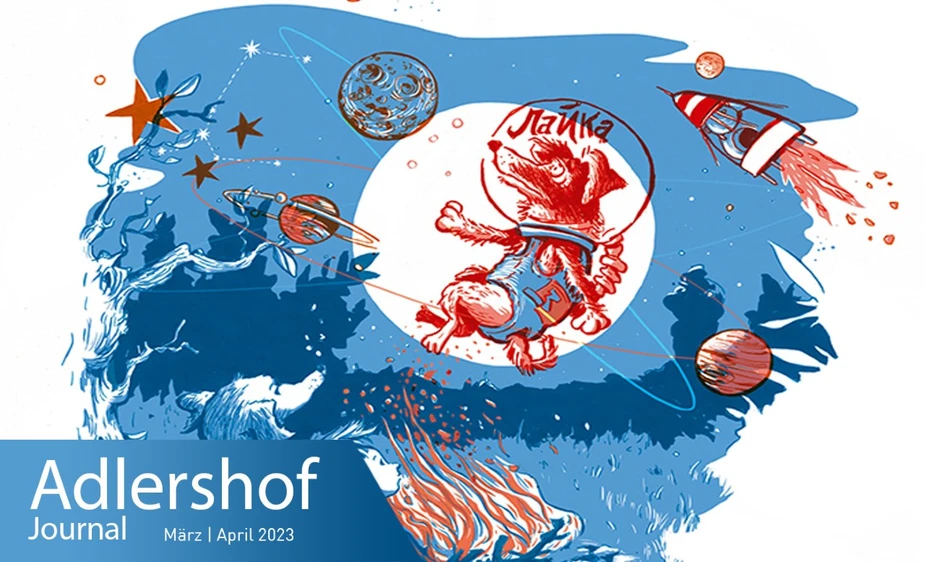Dogs and dads
Essay by Paul Bokowski, Author from Berlin
“Nika could not have fit in there,” I say to you.
Nika’s name is actually Nikita. But when we first came here, you couldn’t remember her name and so you called your grandad’s mutt Nika.
“The capsule was tiny,” I say.
We’re lying in the garden. You’re currently really into the moon. Before Christmas it was dinosaurs, and rockets after Easter. That was because grandma let you watch a Nazi documentary about Peenemünde. The rocket field. The Army Research Centre. How do I know these things? Maybe from grandad. My grandad. So you’re great-granddad.
“Sure?” you ask.
“That’s what they taught me,” I say. “At school. Nika is much bigger. He’s probably four times bigger than the dog from back then.”
“Laika,” you say.
“Yes, Laika,” I say back to you.
I probably wouldn’t have remembered any of that. But, thankfully, when your lunar phase started, you fell right asleep during your first wobbly lecture on the subject. That gave me enough time to smarten up before breakfast. I never had that feeling before. Wanting to be smart for someone. But I looked it up online. Even though I was afraid of seeing your great-grandad among all the links on Wikipedia. I don’t show you these things yet. I’d rather tell you about them. Even if that means telling you everything a hundred times. That Laika was a street dog from Moscow, for example. But so smart and good-natured that no other dog stood a chance. That she had to go into a centrifuge, on a diet, and in a spacesuit, like a real cosmonaut. That it wasn’t about sending her to the moon but only into orbit. And then tell you what that is, an orbit. That I had to learn how to write Laika at school. In Russian.
Nika has stretched out in front of the fire bowl. “How do you write Nika in Russian?” You’re the only one allowed to lie on top of her. You will soon be too heavy, but you can still put your head on her ribcage. You know what Sputnik was. But when I start going further afield to explain about the Cold War, your gaze wanders off into the embers. To watch you staring into the fire bowl kills me. You have my face and that of your grandfather and your great-grandfather. The entire lineage up to you. I wouldn’t mind if you got more from your mum. If that chin, those eyes, and that forehead would soon start to lose definition. You’re the most beautiful child in the world. But if you stumble upon grandpa, mine, so your great-grandpa, on Wikipedia, it is no secret where we both come from. That’s my wish for you. That it stops showing the way it does.
Sometimes, when the fire crackles, it wakes you up. Then I tell you that they gave Laika a statue in Russia, and stamps with her likeness on it.
“Likeness,” you mutter.
“Face”, I say.
Both granddads are still present in the house. There are seven photos of yours. From mine, four. All of them are black and white. Mum turns the photos around in the room we stay in.
It’s starting to get chilly. When you fall asleep, I carry you to bed.
Soon you will be old enough. I will have to tell you about the thing with the granddads. I never had that feeling before. That I wanted to be stupid for someone. I always want to do the right thing. With the granddads, however, I’m not sure what the right thing is. None of them are role models. If the fire wakes you up again, I will tell you the truth. What happened to her? To Laika. A reluctant hero. That she died a few hours after the launch. Perished. Heat death. That her carcass flew around this world two-thousand five-hundred times before burning up. The fire stopped crackling. The only sound is Nika sighing. I reach between your hair and her fur and carry you inside.
Paul Bokowski lives and works in Berlin. His debut novel “Schlesenburg” was published by btb Verlag in autumn 2022.
